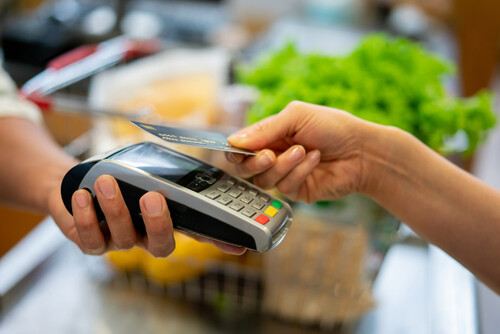15 % de transactions sans contact supplémentaires
Le relèvement du plafond du paiement sans contact a été un succès à la fois technique et commercial. En effet, du 11 au 14 mai, le GIE Cartes bancaires (GIE CB) a enregistré plus de 3 millions de transactions pour un montant compris entre 30 et 50 euros, soit une hausse de 15 % de transactions sans contact supplémentaires. Près de 80 % des paiements par carte bancaire du quotidien sont inférieurs à 50 euros et peuvent désormais être effectués par ce biais.
L’augmentation du plafond du paiement sans contact était envisagée depuis plusieurs mois, mais la situation sanitaire actuelle a permis de l’avancer de quelques semaines par rapport au calendrier prévu. Considéré comme un geste barrière face à la pandémie de Covid-19, ce mode de paiement est aujourd’hui privilégié par les Français.
70 millions de cartes bancaires paramétrées
Le GIE CB précise que le paramétrage de 70 millions de cartes bancaires et de 1,7 million de terminaux de paiement « sans contact » a démarré en avril. Actuellement, près de 90 % des cartes bancaires tiennent compte du nouveau plafond. Le basculement des cartes a été automatique dans certaines banques, notamment chez BNP Paribas, Crédit Agricole et BPCE. Des clients comme ceux de la Société Générale ont dû taper leur code au moins une fois pour pouvoir régler leurs achats en mode sans contact. Enfin, plusieurs néobanques ont annoncé une mise à jour effective dans les prochains mois.
Vers un monde sans cash ?
Face au coronavirus, les commerçants encouragent le paiement sans contact et les transactions en ligne se multiplient pour limiter la transmission du virus. Pour autant, le paiement en espèces ne semble pas menacé à en croire la Fédération des entreprises de la sécurité fiduciaire (FEDESFI) qui observe une hausse des commandes d’espèces de 20 % sur les deux semaines précédant la mise en place du déconfinement. De leur côté, les distributeurs de billets indiquent que le volume des retraits le 12 mai est quasiment équivalent à celui enregistré il y a un an.
La FEDESFI rappelle que les commerçants ne peuvent pas refuser les paiements en cash pour des raisons sanitaires. En cas de refus, ils encourent une amende de 150 euros. La Fédération a récemment saisi la DGCCRF sur le sujet en indiquant que certains acteurs « profitent du contexte sanitaire pour faire de la concurrence déloyale ».
